Connecticut Dem successfully has new legislation amended to include phrase ‘expectant mothers’ after branding woke alternative an ‘affront’
Rep. Robyn Porter on Thursday proposed an amendment to House Bill 5454 to include the term “expectant mothers” during state funding discussions
Lawmakers voted 32-16 to adopt the term “mothers,” reached by Republicans and members of the Legislature’s Black and Puerto Rican Caucus
The leading advocate for the original language of “pregnant persons” in the bill launched by the Human Services Committee was Representative Jillian Gilchrest.
A Connecticut Democrat has successfully proposed new legislation amended to include the phrase “expectant mothers” after labeling the woke alternative, “pregnant persons,” as offensive.
State Rep. Robyn Porter, a Democrat who represents New Haven, proposed an amendment to House Bill 5454 on Thursday to include the term “expectant mothers” during discussions about a bill related to state funding.
‘My children call me mother, ma, mama. It depends on the day,” Porter said Thursday. ‘I don’t listen to pregnant or giving birth people. That’s not what I’m answering.
‘A large part of my identity is tied to the fact that I am a mother and grandmother. “So I find it insulting when someone tries to tell me that what they put on paper for policy purposes covers me, when I say it doesn’t,” she continued.
State Rep. Robyn Porter, a Democrat who represents New Haven, proposed an amendment to House Bill 5454 on Thursday to include the term “expectant mothers” during discussions about a bill related to state funding
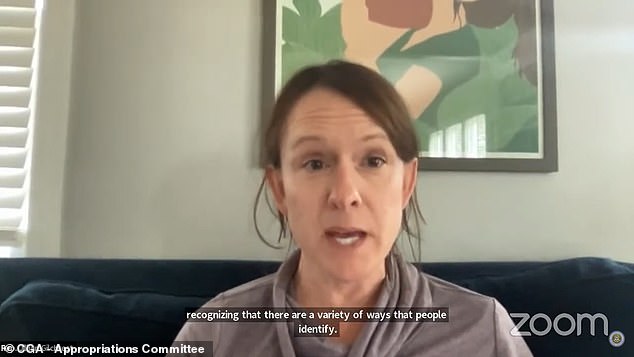
The leading advocate for the original language of “pregnant persons” in the bill, launched by the Human Services Committee, was Representative Jillian Gilchrest.
The bill was originally introduced by the Human Services Committee before appropriations reached to include the phrase “expectant mothers” in lines five and six.
The original lines of the bill stated: “… will create a strategic plan to maximize federal and state mental health resources for children six years of age and younger, their caregivers, and pregnant individuals.”
After a 35-minute debate, lawmakers voted 32 to 16 in favor of the term “mothers.”
The unexpected decision was made by a coalition of Republicans and members of the Legislature’s Black and Puerto Rican Caucus — with all 16 votes against coming from Democrats.
Porter said: ‘We want to talk about discrimination? Well, I’m here to tell you that black people in America know that very well.
“This is where I get really frustrated in this building, because what we say is dismissed, ignored and disrespected. … I am always asked to compromise when I come to the table, and I am expected to do so.
She added: “We were mothers first. Yes, times are changing, and I’m okay with that, because that’s life… But you can’t grow, and you can’t talk about diversity, equality and inclusivity and exclude me and the other women. like me who identify as mothers. You can not do that.’
She said some women “want to be called mothers. What is wrong with that?’
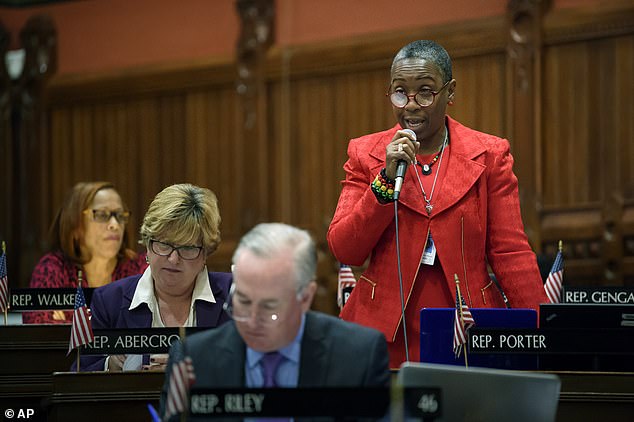
Lawmakers voted 32-16 to adopt the term “mothers” after a 35-minute debate (State Rep. Robyn Porter photo Oct. 26)
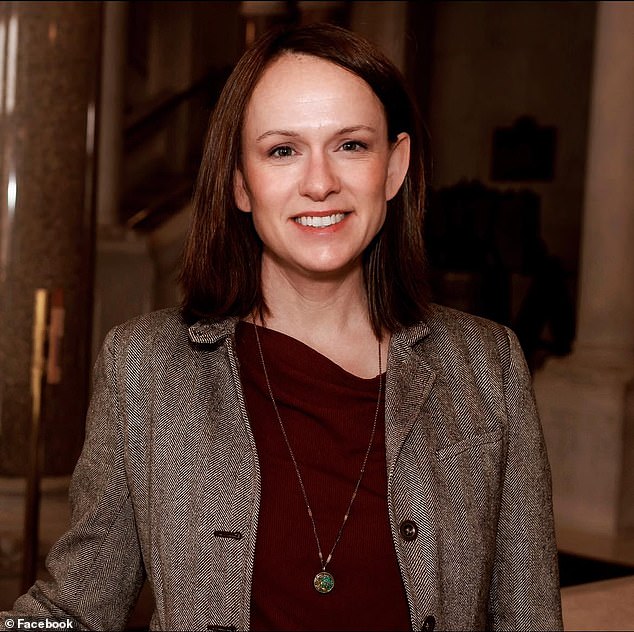
The bill was originally floated by the Human Services Committee before appropriations were reached to include the phrase “expectant mothers” in lines five and six (Rep. Jillian Gilchrest, Democratic State Representative in Connecticut’s 18th District, pictured)
The leading advocate for the bill’s original “pregnant persons” language was Rep. Jillian Gilchrest, a Democrat from West Hartford.
“Pregnant person is actually the inclusive term,” Gilchrest said. ‘It is a gender-neutral term and would also apply to expectant mothers and pregnant women.
“When we talk about DEI, this is the direction we hope to go in this state and ideally across the country.
“And so the term pregnant people is the more inclusive term, and that is why I would ask my colleagues to oppose the amendment.”
Many legislators representing the state’s major urban cities supported Porter’s amendment.
State Rep. Geraldo Reyes, a Democrat from Waterbury and a prominent figure in the Black and Puerto Rican Caucus, emphasized the cultural significance of motherhood.
“Culturally, as a Puerto Rican person, there is nothing more sacred than a mother… There is only one mother… Just as I was against the word Latinx, I am also against the word expectant person,” he said.
Similarly, Rep. Minnie Gonzalez, a Democrat from Hartford, supported Porter’s amendment and emphasized his support for the LGBT community.
“It’s nothing against the LGBT community. “It’s nothing about them,” he said. ‘Nothing against them. We support them… We recognize that they have rights, but where are my rights? I have the right to defend my rights.’
Rep. Anthony Nolan, a Democrat from New London, then highlighted the importance of the word “mother” in black communities.
“I’m just amazed at some of the things that are being said,” he said. “In black culture, where the word mother is really ingrained, if we go home and call our mother anything other than mother, we get a slap in the face.
‘We don’t delete anything. We’re just asking to add something that’s precious to those who speak about it, especially in Black culture.”
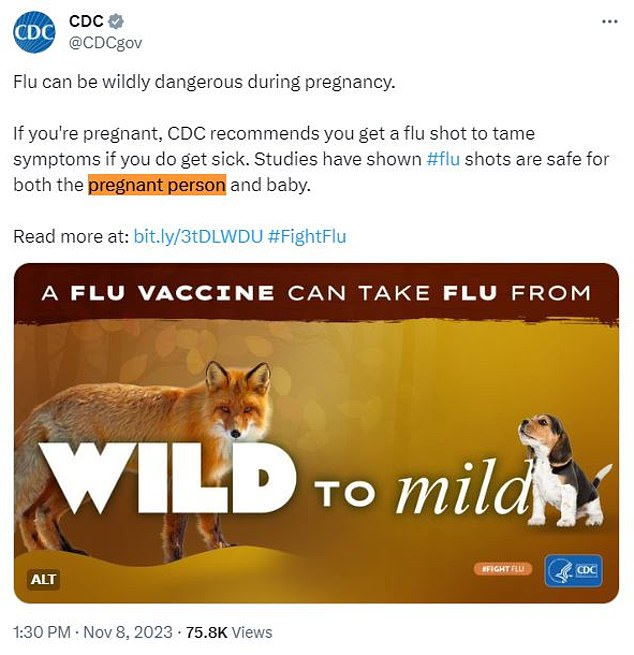
Last year, the CDC was criticized for “terrible” new health guidelines that replaced the word “women” with the gender-neutral term “pregnant people”
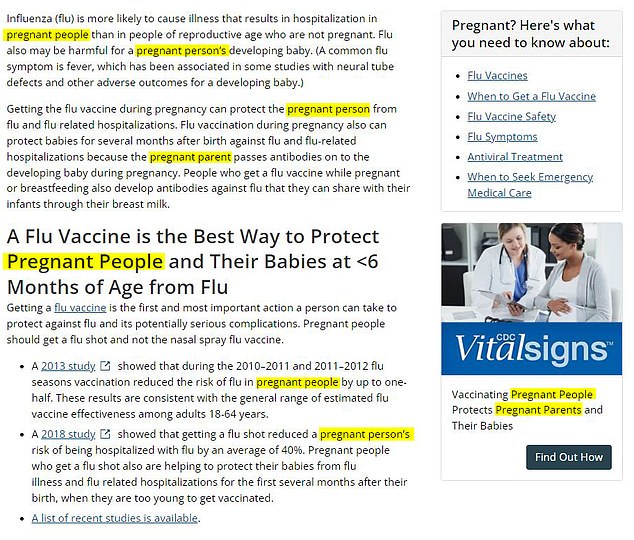
The CDC’s flu vaccine guidelines, which were updated on September 7, 2023, made no mention of pregnant women and instead used the term “pregnant people.”
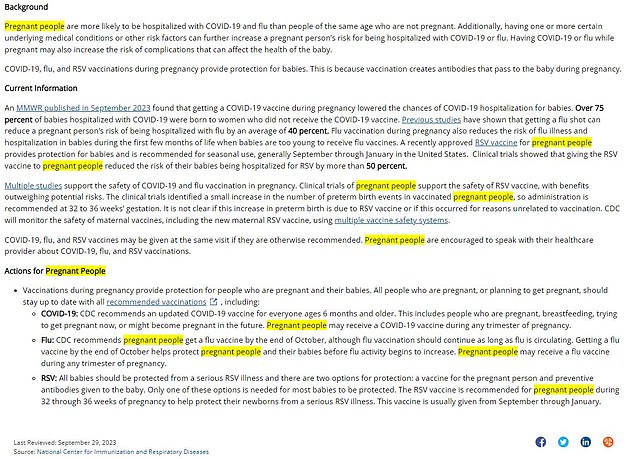
DailyMail.com found that all gender-specific terms – including ‘she’, ‘her’, ‘women’ and ‘mother’ – had been removed from the CDC’s recommendations for the respiratory virus and Covid vaccinations when they were updated last month
Last year, the CDC was criticized for “terrible” new health guidelines, which replaced the word “women” with the gender-neutral term “pregnant people.”
The deletion of the term women is reflected in the recommendations for a large number of respiratory virus vaccinations for pregnant women.
This includes material promoting vaccinations against Covid, flu and RSV – a common respiratory disease that mainly affects older adults and young children.
Although usually mild, all three viruses can be fatal in pregnant women.
All gender-specific terms – including ‘she’, ‘her’, ‘women’ and ‘mother’ – were replaced with gender-neutral terms such as ‘pregnant people’ and ‘pregnant person’.
A doctors’ organization said the CDC at the time “crouched before political forces” at the expense of sound medical advice.
